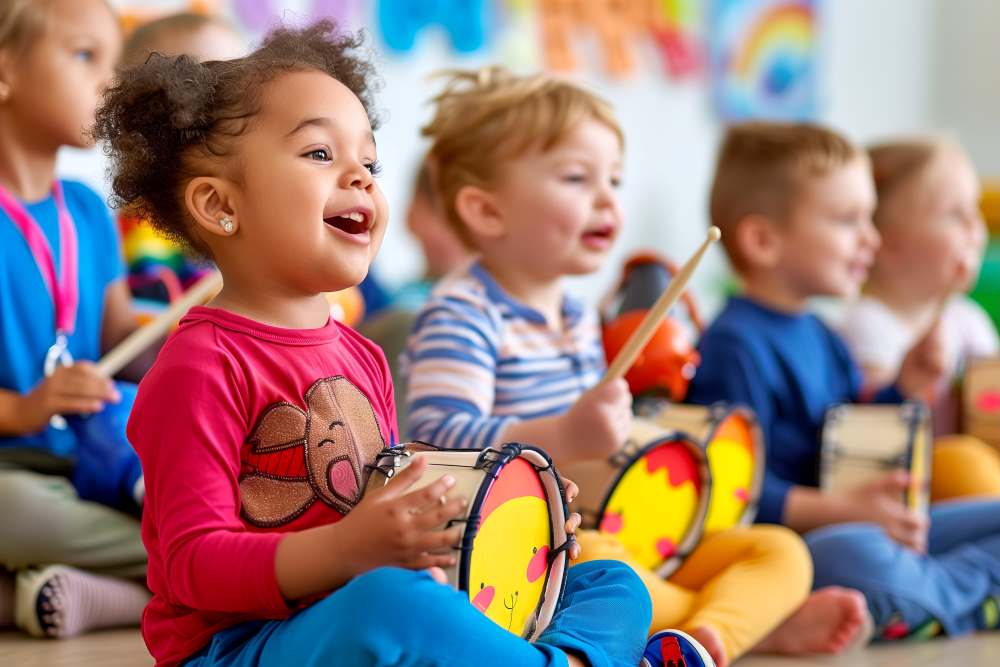
Music does more than entertain—it shapes young minds in powerful ways. From lullabies to classroom songs to quality instrumental music, children exposed to music often show stronger memory, focus, and problem-solving skills. Music engages multiple areas of the brain, which helps kids process information more effectively. Whether through singing, playing instruments, or simply listening, musical activities can support learning in surprising ways.
Here’s how music nurtures cognitive development and why it’s worth incorporating into a child’s daily routine.
1. Music Strengthens Memory and Recall
Remembering song lyrics or a melody comes naturally to many kids, and there’s science behind it. Music activates the hippocampus, the part of the brain responsible for memory formation. When children learn through songs—like the alphabet or counting rhymes—they retain information longer than through rote repetition alone.
For example, think of how easily a child recalls the lyrics to their favorite tune compared to a list of vocabulary words. Music teachers often use songs to teach complex concepts because rhythm and melody make details stick. Over time, this strengthens a child’s ability to store and retrieve information, which is useful in all areas of learning.
2. It Enhances Language Skills
Language and music share common ground in the brain. Both rely on recognizing patterns, rhythms, and sounds. When children engage with music, they sharpen their ability to distinguish between different tones and syllables—a skill crucial for language development.
Nursery rhymes, for instance, introduce kids to the rhythm of speech and help them recognize phonetic sounds. Singing along to songs also improves learning of vocabulary and develops pronunciation. Children who grow up with musical training often develop stronger reading and verbal communication skills early on.
For parents looking to give their children an extra edge, focusing on preschool readiness through music can be highly effective. Reputable early learning centers often incorporate music-based activities because they naturally build the listening, speaking, and social skills needed for a smooth transition into preschool.
3. Music Builds Math and Problem-Solving Skills
At first glance, music and math might seem unrelated, but they’re deeply connected. Counting beats, understanding fractions in rhythm, and recognizing patterns in melodies all involve mathematical thinking. Learning to play an instrument takes this further—reading sheet music requires decoding symbols and translating them into actions, much like solving a puzzle.
Children who engage with music often perform better in math because they practice sequencing, timing, and logical reasoning without even realizing it. For example, clapping along to a rhythm teaches them about division (whole notes, half notes), while identifying musical patterns trains their brain to recognize numerical sequences.
4. It Boosts Focus and Discipline
Learning music isn’t always easy—it takes patience and practice. Whether mastering a new song on the piano or staying in tune while singing, children develop concentration and self-discipline through musical activities. These skills transfer to other areas, like completing homework or following instructions in class.
Structured music lessons, in particular, teach kids to break down complex tasks into smaller steps. Over time, they learn persistence, a trait that helps them tackle challenges in school and beyond.
5. Music Encourages Creativity and Emotional Growth
Beyond academics, daily musical experiences nurture creativity and emotional intelligence. Composing a simple tune or improvising with musical instruments allows children to express themselves in unique ways. This creative outlet helps them process emotions, build confidence, and think outside the box.
Slow, calming kinds of music can also help regulate emotions, which makes it easier for kids to manage stress or frustration. Group activities, like choir or band, teach teamwork and empathy as children learn to harmonize—both musically and socially.
6. Social Skills Flourish Through Musical Interaction
Music is rarely a solo activity in a child’s world. Singing in a choir, playing in a school band, or even clapping along with classmates fosters cooperation and communication. Kids learn to listen, take turns, and work together toward a shared goal.
These interactions build social confidence, especially for shy children who may find it easier to connect through music than conversation. Group student performances also teach responsibility—everyone’s part matters, reinforcing the value of teamwork.
Conclusion
Music isn’t just fun—it’s a powerful tool for cognitive and emotional growth. From sharpening memory to fostering creativity, the positive benefits of musical learning stretch far beyond the classroom. Simple activities like singing, clapping, or exploring instruments can make a big difference in a child’s development. Parents and educators don’t need special training to incorporate classical music into daily routines. By making it a regular part of a child’s life, they set the stage for stronger academic learning skills and a lifelong appreciation for music.



























